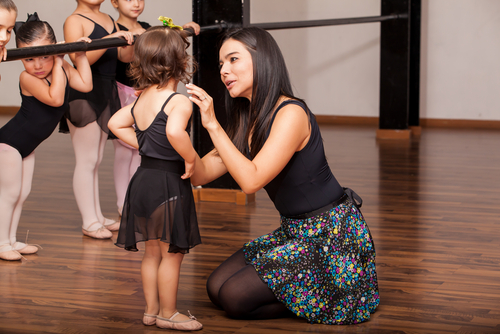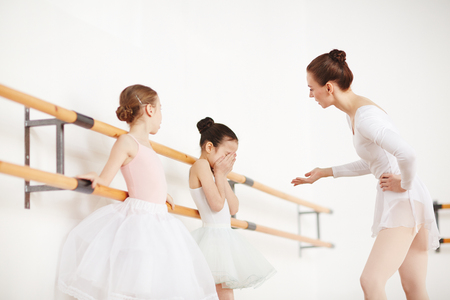Dance Talk
Our dance season never ends. Learn dance tips from the best.
How To Tell If A Dance Mentor Crosses The Line


As a dancer, there are so many benefits to having a mentor. In fact, it's one of the best moves you can make. Getting the most from the relationship, though, means finding the one that's right for you. When you do, the results can be like putting on those perfect pair of leggings; they fit like a glove. Your mentor can guide and encourage you, helping you to enhance strengths, improve weaknesses and find your footing in the world of dance.
That said, there are times when the relationship can cross the line. It can become toxic, or move from a professional connection into an inappropriate and more personal one. So what are some signs your mentor relationship is heading in that direction? And that it's time for you to jump ship? Here's a look:
Your mentor makes you feel bad about everything from the leggings you wear to your dance moves.
The purpose of a mentor isn't always to make you feel good, it's for them to be honest with you so you can maximize your potential. At the same time, they shouldn't purposely be calling you out and embarrassing you in front of others, nor should they ever call you a derogatory name. If they do, how can you ever expect to build trust and a mutually respectful relationship? The answer is: you can't.
Don't let your mentor get away with the attitude that they're just trying to toughen you up so that you can handle the many pitfalls of the dance world, either. That's not their job or the role they should be playing. You will face criticism in your dance career -- from the leggings you wear to an audition to your technique -- and have to learn how to deal with it. However, any feedback they offer you should be constructive and valuable. It shouldn't be hostile and leave you constantly feeling worthless.
Your mentor is too controlling and doesn't want you to make your own decisions.
A mentor has been around the block. They've been there and done that, and can therefore offer you insight and guidance so you don't make the same mistakes they did. At the same time, that doesn't mean they should be trying to control you. In other words, they shouldn't try to stop you from taking a path that you truly feel in your heart is right for you. They should, instead, be guiding you, from how to nail your next audition to how to improve a certain step to what hip hop clothing looks best on you.
At the end of the day, a mentor is supposed to be looking out for your best interest and sometimes that means you following your own instincts. Sure, that might mean some missteps, too. But your mentor should simply serve as your sounding board, someone you can go to for advice and wisdom, as well as to ask questions. They should then step back so you can make your own choices, while still pointing out the potential obstacles and pitfalls you could face.
Your mentor doesn't want others giving you direction, including your own teachers and parents.
Another sign that your mentor relationship is going down the drain is when they become jealous or upset when you take advice or counsel from someone else. They start to see themselves as the only point person who should be offering direction to you. But this is a big problem because -- while they might reap some benefits -- the relationship isn't necessarily about them. It's about you becoming the best dancer you can be. Sometimes, that means getting tips and feedback from other sources. Your mentor should welcome that and not be opposed to it.
Your mentor speaks negatively about others, from gossiping to backstabbing.
Everyone gets frustrated, even the most mature and professional dance mentor. However, they shouldn't vent those frustrations in the form of gossip and negative comments about others, like making fun of a dancer's hip hop clothing or mocking someone's dance moves. Instead, they should be a positive presence, providing you with valuable lessons to learn from.
If, however, they're more focused on bringing down the performance of others than on lifting you up, it's time to reconsider your relationship for a couple reasons. First, if they talk negatively about other dancers or teachers behind their backs, then the chances of them doing the same to you are pretty high. Not only that, but their attitude can actually end up having a toxic impact on your performance and your growth as a dancer.
Your mentor is too nosy and wants to find out information that isn't pertinent to your relationship.
Your mentor will likely ask you a lot of questions in an effort to get to know you and your dance goals. However, when it feels like they want to know everything about you -- including personal details of your life -- then it's time to move on from the relationship. They should be focused on your dancing abilities and where you want to take your career. Not who you're dating, where you shop, or how you feel about your friends. When the relationship starts to drift off into these areas, it's getting too personal and can begin to feel inappropriate.
Your mentor crosses a boundary -- and you instantly feel it.
You come to lean on a mentor and can develop a close relationship with him or her. However, you'll know when a boundary gets crossed by how you feel. Your gut instincts will likely get triggered, communicating that something isn't right. It could be something they say or that they do. Whatever the case for your relationship, when you feel like it's crossed a line, whether real or perceived, it's time to move on.
Your mentor should make you feel encouraged and uplifted. They should not make you feel worthless and uncertain. So if you're starting to feel the latter with your mentor -- or you're noticing some of the warning signs above -- then it's time to move on and get another mentor, one that can truly help you to enhance your dance career.

Follow Us
Follow Us online, join our conversations, engage with our teams around the world!